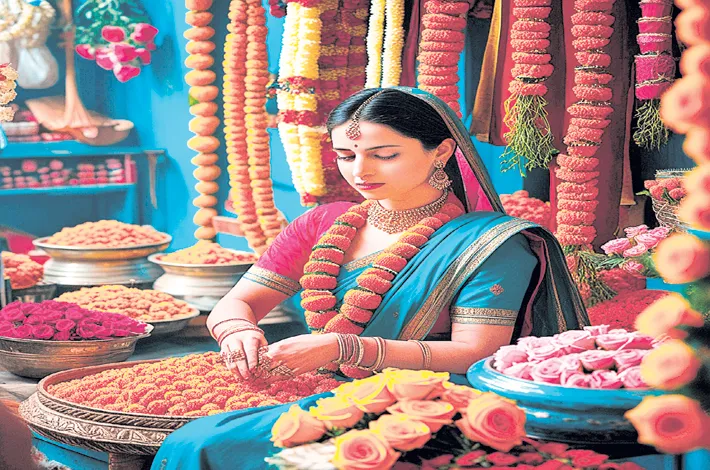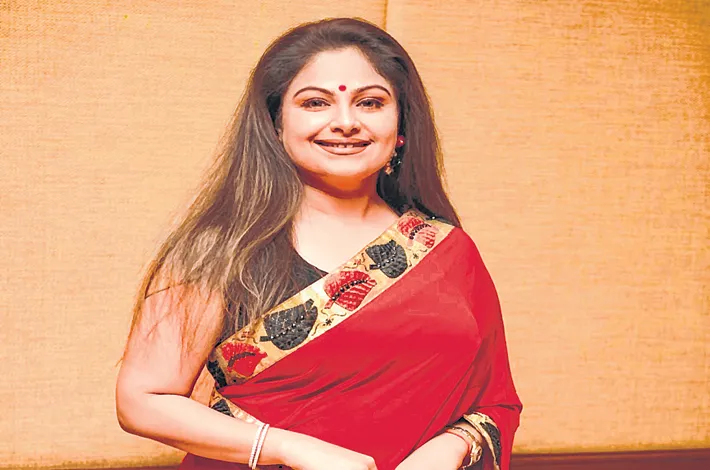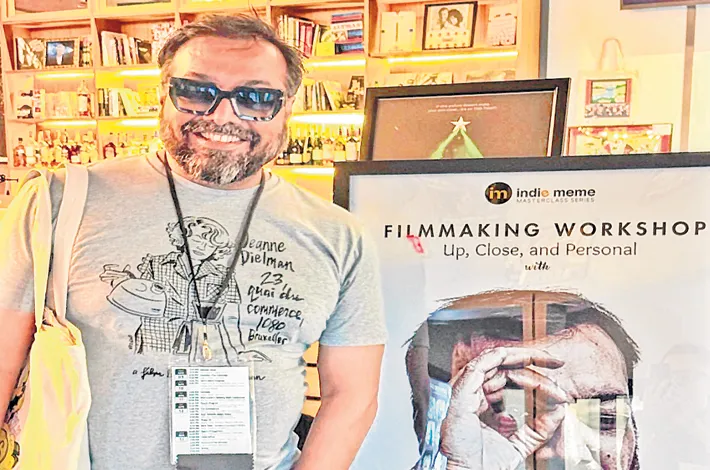A Rose in the Rain
12-04-2025 12:00:00 AM

Years later, the shop still stood, now called "Ek Phool Do Mali"—a nod to the love that had grown there and the boy they’d nurtured together. Vikram, now a college student, helped out on weekends, his laughter echoing through the shop. Meera and Arjun, married and content, tended their flowers and their dreams, knowing that love, like a rose, thrives not just in sunlight but through every storm they faced together
In the bustling city of Jaipur, where the pink hues of ancient palaces mingled with the vibrant chaos of modern life, lived Meera, a young woman with dreams as vast as the Thar Desert. Meera ran a small flower shop, "Phoolon ki Dukan," tucked away in a quiet corner of the old city. Her days were spent weaving garlands of marigolds and roses, her fingers deftly threading hope into every petal. Yet, her heart carried a quiet ache—a longing for love she hadn’t yet found.
One rainy afternoon, as monsoon clouds draped the city in a silver veil, a man named Arjun ducked into her shop, seeking shelter. His clothes were damp, his hair tousled, but his eyes held a warmth that made Meera’s heart skip. He was a schoolteacher, he said, new to Jaipur, with a love for poetry and a smile that felt like sunlight breaking through clouds. They talked—first about the weather, then about flowers, and soon about dreams. Arjun bought a single rose, promising to return.
He did. Every evening, after his classes ended, Arjun would stop by. Sometimes he’d buy a flower; other times, he’d just sit and listen as Meera shared stories of her childhood, of her late father who’d taught her to see magic in every bloom. Arjun, in turn, recited verses from Ghalib and Tagore, his voice weaving a spell that made the tiny shop feel like a universe of its own. Love blossomed quietly, like a lotus unfurling in a hidden pond.
But life, like a monsoon, is unpredictable. One day, Meera noticed Arjun seemed distracted, his laughter less free. When she pressed him, he hesitated, then confessed: he was raising his younger brother, Vikram, a bright but rebellious teenager who’d fallen into bad company. Arjun was torn between his duties and his heart, unsure if he could offer Meera the future she deserved. Meera, though, saw no conflict. “Love isn’t a burden, Arjun,” she said, her eyes steady. “It’s a garden we tend together.”
Determined to help, Meera befriended Vikram. She’d invite him to the shop, teaching him to arrange flowers, sharing stories of resilience—how her mother, widowed young, had raised her alone. Vikram, initially wary, began to soften. Meera’s warmth, her belief in him, chipped away at his defiance. She saw in him a boy craving guidance, not judgment. Arjun watched, amazed, as his brother started attending school again, his scowl replaced by a tentative smile.
Yet, fate had more twists. Meera’s shop faced trouble when the landlord, a greedy man named Mr. Sharma, raised the rent beyond her means. The shop wasn’t just her livelihood; it was her father’s legacy, a place where memories bloomed alongside flowers. Losing it would break her. When Arjun learned of this, he rallied the community—his students, their parents, even Vikram, who painted signs to draw customers. They organized a festival at the shop, selling bouquets and garlands, turning the little corner into a riot of color and hope. The event raised enough to pay the rent for months, but more than that, it showed Meera she wasn’t alone.
One evening, after the festival’s success, Arjun took Meera to the banks of Man Sagar Lake. The Jal Mahal glowed softly in the distance, its reflection shimmering like a dream. Under a banyan tree, Arjun knelt, holding a rose he’d plucked from her shop that first rainy day. He’d kept it pressed in a book, a reminder of when his heart had found its home. “Meera,” he said, his voice trembling, “you’ve taught me that love isn’t just a moment—it’s every choice we make to stand together. Will you choose me?”
Meera’s eyes glistened, not with tears but with joy. She took the rose, its faded petals still fragrant, and nodded. “I’ve chosen you since the day you walked in,” she whispered. They embraced, the world around them fading until it was just them, two souls intertwined like vines in a garden.
Years later, the shop still stood, now called "Ek Phool Do Mali"—a nod to the love that had grown there and the boy they’d nurtured together. Vikram, now a college student, helped out on weekends, his laughter echoing through the shop. Meera and Arjun, married and content, tended their flowers and their dreams, knowing that love, like a rose, thrives not just in sunlight but through every storm they faced together.
In Jaipur’s heart, where old and new danced, their story bloomed—a testament that one flower, tended with care, could yield a garden of forever.








